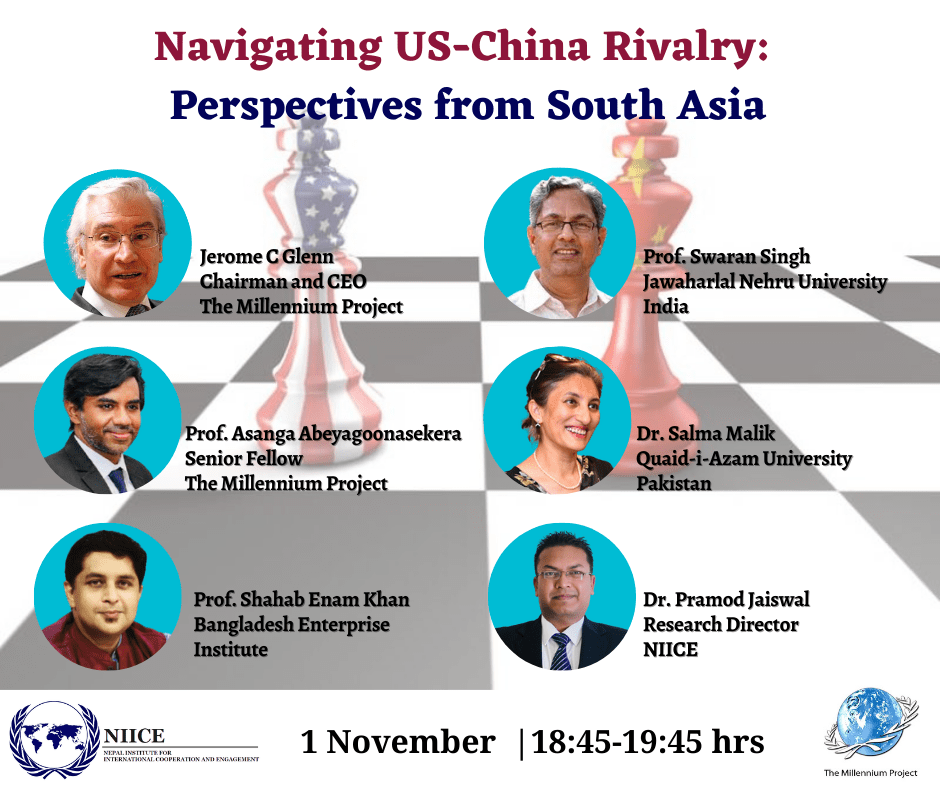KATHMANDU: Jerome Glenn, Chairman and CEO of Director of the Millennium Project, remarked that the South Asian region needs to push both US and China for a long term collaboration and cooperation. He stressed that the only area that has the potentiality to actually forge collaboration between these two rival powers is environment security and more precisely global warming.
Speaking at the joint event of Nepal Institute for International Cooperation and Engagement (NIICE) and Millennium Project, Washington DC, on ‘Navigating US-China Rivalry: Perspective from South Asia’ Tuesday, Director of NIICE, Dr. Pramod Jaiswal stated that, “All the small nations in the South Asian regions want to remain neutral and refrain from taking sides as they believe that they do not have the capacity to defuse rising tension between US and China.”

Taking his turn, Professor Swaran Singh, Professor for Diplomacy and Disarmament at Center for International Politics, JNU, discussed how US-China rivalry is changing shape of existing local rivalries in South Asia and how these local rivalries are influencing US-China global rivalry. He talked about the closeness of United States with India and how India is shifting toward the USA like it once was with Russia during 1970’s.
According to Prof. Singh, today the world is also divided between the two global powers China and US. Stating how USA switches sides based on their own personal interest and drawing a note of caution, he asked South Asian countries to stick together and become powerful enough to protect their own personal interest.
Opinionating from Bangladesh, Prof. Shahab Enam Khan, Director, Bangladesh Enterprise Institute and Visiting Fellow at NIICE, emphasized that on the national level the rational choice between US and China will be more on the line of geo-economics than geo-strategy, i.e., the market choices both the rival countries will be providing to Bangladesh.
Therefore, in order to have a comprehensive development, Bangladesh must have a multilateral approach of engaging countries, using both foreign and domestic policy measures. At the same time, on the international level, he mentioned that the South Asian countries could gain more leverage against the US-China rivalry choices if they are able to overcome the mistrust and build a strong regional geopolitical structure within themselves.
Joining the list of esteemed panelists, Asanga Abeyagoonsekera, an International Security and Geopolitics Analyst and Strategic Advisor from Sri Lanka, spoke from a Sri Lankan perspective. He spoke on the matter of China’s strategic trap in South Asia and how Sri Lankan foreign policy is being affected by the bandwagon China’s policy, rise of ultra nationalism, and effects of vaccine diplomacy and Sri Lankan model of state getting inspired by the China’s model of development slowly.
The speaker mentioned that the intervention of China’s strategy is making the elite institutions and bodies of government in South Asian countries vulnerable. He urged the need for the South Asian states to cooperate and step up their diplomatic finesse, commercial innovation and institutional creativity and recommended that there is need of cooperation between US and China to save the region from getting polarized in the matter of tech, cyber, climate and energy.
Dr. Salma Malik, an Assistant Professor at the Department of Defense and Strategic Studies, Quaid-I-Azam University, Pakistan, speaking during the event mentioned that China provides unconditional economic support to Pakistan. Negative side of this cooperation is making Pakistan ground zero for US and China rivalry. While US and China rivalry don’t directly damage themselves, the increasing strategic partnership between India and US has made Pakistan extremely uneasy.
She further went on to stress that India and Pakistan would be another emerging rivalry compared to existing US and China rivalry. Ending her presentation, she urged that Pakistan should not choose sides in US and China rivalry. If not, it would be difficult for Pakistan. In a time of today’s pressing problems, it’s time for joint cooperation and to mitigate the challenges in the possible ways.
The event featured six esteemed panelists from India, Pakistan, Bangladesh, Sri Lanka, United States and Nepal.









Comment